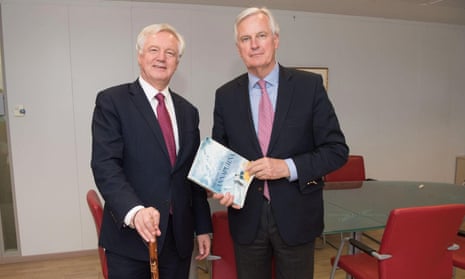First the handshakes and generous expressions of goodwill. Not forgetting the obligatory exchange of gifts: a mountaineering book from David Davis to Michel Barnier, a hiking pole from Barnier to Davis. When you’re heading over a cliff, you need all the help you can get. Davis couldn’t have been more charming. The EU was a magnificent institution, the best of the best, and the UK was keen to have the very closest links possible.
Just as it looked as if Davis might be about to have a change of heart and beg Barnier to let us stay after all, the bell rang for the start of the negotiations. The two teams headed off behind closed doors, with Davis exuding all the confidence of a non-league manager up against Barcelona. Several hours later he emerged for the press conference looking decidedly frazzled. His face was hot and sweaty and his hair was a mess. Lucky he’s still got plenty more to pull out.
Barnier, though, appeared remarkably unbothered. The talks had been constructive. He had laid out the EU’s demands on the timetable for the talks and Britain had caved in to all of them. Things couldn’t have got off to a better start.
Once citizens’ rights, the financial settlement and any other issues the EU considered important – don’t call us, we’ll call you – had been more or less agreed in principle, then Barnier might get round to considering the UK’s main concern – its future trading relationship with the EU. “I’m neither optimistic, nor pessimistic,” the EU capo di capi said casually. “I’m determined.” Determined to make life difficult for Davis, while appearing to be helpful. The clock was ticking and he wasn’t bothered how quickly it ran down.
With the UK having gone 3-0 down in the first minute, Davis tried to take a few upsides from the opening day’s talks. There was still plenty to play for, the lads had kept their heads up and had knocked the ball around nicely under the circumstances. The talks had been really useful and he was thrilled with his walking stick.
It had been good that the EU had agreed to the timetable that Britain hadn’t wanted to agree to, and he was looking forward to reaching a deal of some description. He finished by quoting Churchill – or believing he was, as there is no evidence that the great man ever said: “The pessimist sees difficulty in every opportunity and the optimist sees opportunity in every difficulty.” He forgot to add that the realist sees difficulty in every difficulty.
Davis’s panglossian take began to fall apart when the media were allowed to ask questions. First up was Ireland. Wasn’t it significant that Ireland was relegated to any other business when the UK wanted to make it a priority? Not at all, Davis insisted. The fact that it was under any other business was a sign of just how keen the EU was to resolve the border issues. Barnier just shrugged. “Ireland would require some imaginative solutions,” he said. He couldn’t think what they might be, but if anyone saw some flying pigs …
When ITV’s James Mates pointed out that everything was happening according to the EU timetable and that Britain had already given in to everything the British government had previously insisted was a red line in the negotiations, Davis began to implode. “Everything is exactly the same as before,” he yelled. “We will be leaving the single market and the customs union and the timetable is exactly the one we asked for. Nothing is decided until everything is decided.”
At this point Barnier began to get seriously concerned. His assumption that Davis had understood the real meaning behind the opening pleasantries had clearly been totally mistaken. He had imagined that Davis was bright enough to understand the rules of the game, but now it was looking as if the Brexit minister was simply a bit of an idiot. Davis didn’t even seem to realise he had agreed to making the terms of the financial settlement a priority, as he hadn’t bothered to mention it once despite being repeatedly pressed on it.
Time to spell things out for the halfwit. “We need to remain calm,” Barnier said menacingly. Here was the deal. The EU hadn’t made any concessions because it hadn’t needed to. It was the UK that wanted to leave the EU, not the EU who had wanted to leave the UK. He had warned that there would be trouble if Britain left the EU, and if the Brits were stupid enough to go through with it, then they deserved everything they got. It wasn’t about the EU punishing the UK – it was just that the consequences of leaving the EU would inevitably be punishing.
Just as things were about to turn really nasty, an EU official called the press conference to an end. Barnier smoothed his tie and strode off, having added another goal in injury time.

